Classic Commentaries and Studies on Acts Upgrade (36 vols.)
Digital Logos Edition
This product has been transferred from Community Pricing to Pre-Pub. The actual funding level may be lower than it appears, which could delay production. The amount of funding still needed will be evaluated and updated soon.
Overview
The Classic Commentaries and Studies on Acts Upgrade (36 vols.) contains some of the most significant classic studies on the book of Acts from the nineteenth and early-twentieth centuries. With authors such as William Arnot, Joseph Parker, and David Thomas, this collection offers more than 11,000 pages of exegetical analysis, rhetorical context, contextual comparison, and interpretation. This collection provide a range of resources that will satisfy the interests of ministers, academics, and laymen. These 36 volumes have had an enduring impact on New Testament exegesis, and this exceptional collection provides easy accessibility to this wealth of significant scholarship.
The Classic Commentaries and Studies on Acts Upgrade (36 vols.) is invaluable for students, scholars, pastors, historians, teachers of the Bible, and anyone studying Acts. With Logos Bible Software, these time-tested volumes are enhanced by cutting-edge research tools. Scripture citations link directly to English translations, and important terms link to dictionaries, encyclopedias, and a wealth of other resources in your digital library. With Logos’ advanced search features, you can perform powerful searches by topic or Scripture reference. Logos’ tablet and mobile apps let you take your study wherever you go.
Get more classic volumes on Acts with the Classic Commentaries and Studies on the Acts of the Apostles (31 vols.).
- Over 11,000 pages of scholarship on Acts
- Noted authors from a wide variety of backgrounds
- Blend of devotional and academic commentary
- Title: Classic Commentaries and Studies on Acts Upgrade
- Volumes: 36
- Pages: 11,704
- The Acts of the Apostles: The History of the Church in the Apostolic Age, vol. 1 by M. Baumgarten
- The Acts of the Apostles: The History of the Church in the Apostolic Age, vol. 2 by M. Baumgarten
- The Acts of the Apostles: The History of the Church in the Apostolic Age, vol. 3 by M. Baumgarten
- The Contents and Origin of the Acts of the Apostles Critically Investigated, vol. 1 by Edward Zeller
- The Contents and Origin of the Acts of the Apostles Critically Investigated, vol. 2 by Edward Zeller
- The Acts of the Apostles According to the Text of Augustus Hahn by John J. Owen
- The Participle in the Book of Acts by Charles Bray Williams
- The Primitive Text of the Gospels and Acts by Albert C. Clark
- The Acts of the Apostles: Chapters 13–28 by Charles Brown
- The Acts of the Apostles: Greek Text with Notes by W. F. Burnside
- The Acts of the Apostles with Notes Critical and Practical by M. F. Sadler
- The Acts of the Apostles by Thomas Walker
- The Acts of the Apostles with Introduction by E. C. W. Hannan
- The Acts of the Apostles in Greek and English with Notes by Frederic Rendall
- An Introduction to the Study of the Acts of the Apostles by J. M. Stifler
- A Commentary on the Acts of the Apostles by C. M. Du Veil
- The Church in the House: A Series of Lessons on the Acts of the Apostles by William Arnot
- The Acts of the Apostles with a Commentary by F. C. Cook
- The Acts of the Deacons: A Course of Lectures by Edward Meyrick Goulburn
- The Evidential Value of the Acts of the Apostles by J. S. Howson
- Acts of the Apostles: A Homiletic Commentary by David Thomas
- Apostolic Life as Revealed in the Acts of the Apostles, vol. 1 by Joseph Parker
- Apostolic Life as Revealed in the Acts of the Apostles, vol. 2 by Joseph Parker
- Apostolic Life as Revealed in the Acts of the Apostles, vol. 3 by Joseph Parker
- Apostolic Succession Considered in the Light of the Facts of the History of the Primitive Church by W. Hay M. H. Aitken
- Bible Studies on the Book of the Acts: Chapters 1–7 by H. W. Oldham
- Important Facts to Understand: Acts: The Dispensational Battle-Ground by J. C. O’Hair
- Jerusalem to Rome: The Acts of the Apostles by Charles Fremont Sitterly
- Lessons on the Acts of the Apostles by G. R. Balleine
- New Studies in Acts by Edward I. Bosworth
- Notes on the Acts of the Apostles: Explanatory and Practical by George W. Clark
- People’s Commentary on Acts by Edwin W. Rice
- Pictures in the Book of Acts: The Unfinished Work of Jesus by David Anderson-Berry
- Studies in the Book of Acts by Grace Saxe
- Studies in the Acts of the Apostles by J. Cynddylan Jones
- The Acts: Life Changes from the Risen Christ by Janie W. McGaughey
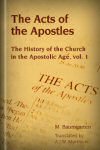
In this 1854 commentary, Michael Baumgarten seeks to provide the same rigorous scholarship other New Testament literature of the nineteenth-century commentaries offered, but was lacking for Luke’s account of the church’s earliest days. Baumgarten focuses on the book of Acts as the divinely inspired word of God, and looks for overarching themes in a history that many thought to be haphazardly constructed. Volume one covers Acts 1–14.
Michael Baumgarten (1812–1889) was a German protestant theologian and professor of theology at the University of Rostock. Conflict with Mecklenburg ecclesiastical authorities led to his dismissal from the university. At several points he sat in the Reichstag as a member of the progressive party.
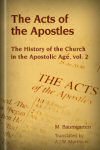
In this 1854 commentary, Michael Baumgarten seeks to provide the same rigorous scholarship other New Testament literature of the nineteenth-century commentaries offered, but was lacking for Luke’s account of the church’s earliest days. Baumgarten focuses on the book of Acts as the divinely inspired word of God, and looks for overarching themes in a history that many thought to be haphazardly constructed. Volume two covers Acts 15–21.
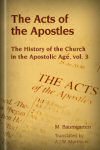
In this 1854 commentary, Michael Baumgarten seeks to provide the same rigorous scholarship other New Testament literature of the nineteenth-century commentaries offered, but was lacking for Luke’s account of the church’s earliest days. Baumgarten focuses on the book of Acts as the divinely inspired word of God, and looks for overarching themes in a history that many thought to be haphazardly constructed. Volume three covers Acts 22–28.
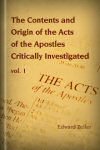
Edward Zeller’s influential nineteenth-century investigation of Acts critically examines the origin and historicity of the book of Acts. Zeller argues there are significant, irreconcilable differences between the author of the Pauline epistles and the Paul who becomes the central character in the narrative of Acts. Volume one includes an introduction to the book of Acts by F. Overbeck and part one and two of Zeller’s investigation—covering the historical evidence of the existence of Acts and the historical subject matter of Acts.
Edward Zeller (1814–1908) was a German philosopher and theologian of the Tübingen School of theology. His method was heavily influenced by Hegel’s dialectical philosophy. He is most famous for his landmark work, Philosophy of Greeks in Their Historical Development.
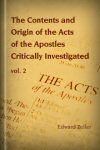
Edward Zeller’s influential nineteenth-century investigation of Acts critically examines the origin and historicity of the book of Acts. Zeller argues there are significant, irreconcilable differences between the author of the Pauline epistles and the Paul who becomes the central character in the narrative of Acts. Volume two continues examining the historical subject matter of Acts and critically examines the origin of Acts
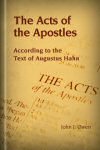
Intended to serve as a textbook for studying the Greek text of Acts in Greek language classes, this volume features the Greek text of Acts, based on Hahn’s Novum Testamentum Graece. John J. Owen provides notes for grammatical exegesis and comments on particularly obscure points. Owen also provides a brief summary of the narrative and a dictionary of Greek words used.
John J. Owen was professor of Latin and Greek languages and literature at the New York Free Academy.
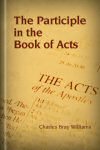
This volume contains Charles Bray Williams PhD dissertation. Bray examines the author’s frequent use of participles and examines how this frequency can inform our understanding of New Testament Greek and Acts’ authorship, composition, and unity.
Charles Bray Williams (1869–1952) was professor of Greek and ethics at Union University, Jackson, Tennessee. He was a Baptist pastor and preacher.
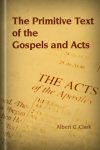
In this volume of textual criticism, Albert C. Clark examines the ancient manuscripts containing the book of Acts and the gospels. He focuses on addressing the reason for slight inconsistencies and omissions among various manuscripts.
Albert C. Clark was corpus professor of Latin at Oxford University.
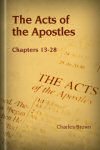
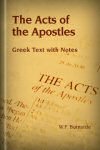
This volume contains the Greek text of Acts with an introduction and notes by W. F. Burnside. It is intended to serve as a textbook for studying the Greek text of Acts in Greek language classes. It also includes an index of Greek words.
W. F. Burnside was headmaster of St. Edmund’s School, Canterbury and the author of Old Testament History for Schools and St. Luke in Greek.
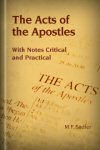
In this volume, M. F. Sadler provides a verse-by-verse critical commentary on the book of Acts. His exegesis focuses on practical explanation and detail. Sadler approaches the text as the divinely inspired word of God, looking for God’s intent in communicating the events of Acts to the reader.
M. F. Sadler was an Anglican priest and the rector of Honiton. He is also the author of critical commentaries on Corinthians, Romans, Matthew, and Mark.
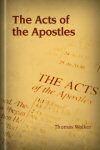
Part of the Indian Church Commentaries, Thomas Walker’s commentary on Acts is written in English with Indian readers in mind. Walker’s commentary was designed to be translated into Indian vernacular languages and provide sound, scholarly commentary in the Indian idiom.
Thomas Walker was an Anglican minister and member of the Church Missionary Society in South India.
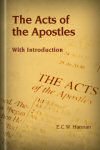
This volume contains E. C. W. Hannan’s commentary on the book of Acts. It includes extensive notes, glossaries, an index, and study questions based on the Cambridge local examinations.
E. C. W. Hannan was an Anglican minister. He is also the author of Handbook for Divinity Students and Essays on the Synoptic Problem.
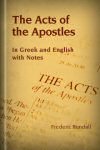
This volume features Frederic Rendall’s commentary on both the Greek text and an English translation of Acts. Rendall approaches the text as the divinely inspired word of God. Included are Rendall’s introduction to Acts and Greek and English appendixes and indexes.
Frederic Rendall was a fellow of Trinity College, Cambridge and assistant headmaster of Harrow School. Rendall is also the author of The Epistle to the Hebrews in Greek and English and Theology of the Hebrew Christians.
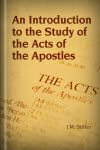
In his investigation of the book of Acts, J. M. Stifler continually asks, “why was this said?” He states that narrative’s facts are plain, and through his commentary he seeks to discover what we can learn from this set of plain facts. In Stifler’s own words, “technical terms have been shunned. It has been a study to write an exposition of Acts that could be read with profit without consulting other books.”
J. M. Stifler was professor of New Testament exegesis at Crozer Theological Seminary. He is also the author of a commentary on Romans.
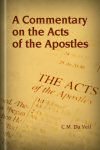
C. M. Du Veil’s commentary, originally published in Latin in 1685, is presented here in the 1851 edition translated and with an extensive introduction by F. A. Cox.
Dr. C. M. Du Veil was a seventeenth-century British commentator.
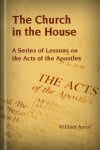
William Arnot’s nineteenth-century commentary is designed for family use, easily accessible to anyone with a basic education and knowledge of Scripture.
William Arnot (1808–1875) was a Scottish preacher and writer. He was a minister of the Free Church in Edinburgh. Arnot focuses on providing “simple elucidation and enforcement of [the book of Acts’] lessons, as they bear on our own times and our own circumstances.”
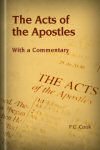
This volume contains F. C. Cook’s commentary on Acts, written as a basic guide to understanding and to aid in “drawing practical inferences from the Word that was given to make us ‘wise unto salvation.’“ Cook includes a basic introduction to Acts and provides devotional suggestions at the end of every chapter.
F. C. Cook (1810–1899) was a respected biblical scholar and extraordinary linguist, rumored to have a working knowledge of over 50 languages. As editor of and contributor to The Speaker’s Commentary, he was tasked with giving the Anglican Church’s response to the growing controversy surrounding the writings and teachings of Bishop Colenso and other modern critics.
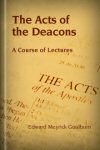
This volume contains a course of lectures from Edward Meyrick Goulburn intended to provide critical analyses and practical application. He focuses on the actions of Stephen, the first martyr, and Philip the Evangelist, in Acts 6, 7, 8, and 11.
Edward Meyrick Goulburn (1818–1897) was educated at Balliol College, Oxford. In 1866 he was made dean of Norwich. He is the author of Thoughts on Personal Religion and The Pursuit of Holiness.
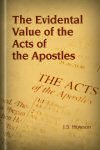
This volume contains J. S. Howson’s Bohlen Lectures from 1880. The four lectures cover a general overview of Acts, its historicity in relation to the Gospels, its relationship to the apostolic epistles, and its place in Christian instruction and edification.
J. S. Howson (1816–1885) was an English divine and dean of Chester. He was born at Giggleswick-on-Craven, Yorkshire. After receiving his early education at Giggleswick School, of which his father was headmaster, he went to Trinity College, Cambridge, and there became tutor successively to the marquess of Sligo and the marquess of Lorne. In 1845 Howson, having taken orders, accepted the post of senior classical master at the Liverpool College under his friend W. J. Conybeare, whom he succeeded as principal in 1849.
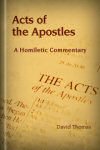
David Thomas’ volume preaches through the entirety of Acts in 111 sections. Each begins with the biblical text, and then offers exegetical remarks on the text followed by a short homiletic.
David Thomas is also the author of A Homiletical Commentary on the Gospel of John.
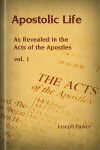
Joseph Parker’s Apostolic Life as Revealed in the Acts of the Apostles examines the first-century church as it is presented in the book of Acts. Volume one covers from the ascension of Christ to the withdrawal of Peter.
Joseph Parker (1830–1902) studied at University College and Cavendish College. He was a pastor in Banbury from 1853 to 1858 and then at Cavendish Street Chapel in Manchester. In 1869, Parker became the pastor of Poultry Chapel in London, founded by Thomas Goodwin. He served as chairman of the London Congregational Board and the Congregational Union of England and Wales.
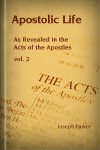
This second volume of Joseph Parker’s Apostolic Life as Revealed in the Acts of the Apostles examines the first-century church as it is presented in the book of Acts. Volume two covers Acts 13 to 19.
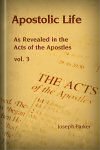
This third volume of Joseph Parker’s Apostolic Life as Revealed in the Acts of the Apostles examines the first-century church as it is presented in the book of Acts. Volume three covers Acts 20 to 28
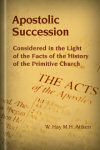
W. Hay M. H. Aitken’s Apostolic Succession examines the subject through the lens of first-century church history as it is presented in Acts.
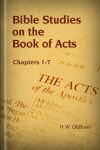
This volume contains a series of devotional commentaries on the first seven chapters of Acts. Designed with college study groups in mind, H. W. Oldham divides the text into daily reading portions accompanied by Oldham’s concise notes to stimulate thought and discussion.
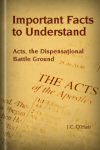
In this volume, J. C. O’Hair lays out key facts to elucidate a study of Acts. O’Hair focuses on the eschatological implications of Acts.
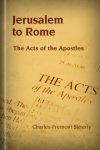
Charles Fremont Sitterly’s commentary on Acts presents Sitterly’s own English vernacular translation of Acts on the right page and his commentary on the left page. Sitterly includes miscellaneous information and cross references after his introduction to Acts, lending his commentary a clean and straightforward feel, always directly pertaining to the text on the opposite page. Famous for being the friendly professor, Sitterly comments with clear and engaging prose.
Charles Fremont Sitterly (1861–1943) was a Methodist preacher, pastor and professor. He earned his PhD from Syracuse and his BD from Drew Theological Seminary. He was professor of biblical literature and exegesis for 40 years at Drew Theological Seminary in New Jersey.
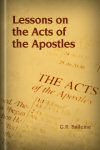
G. R. Balleine’s Lessons on the Acts of the Apostles contains 53 children’s Sunday school lessons designed to fill a year with the study of Acts. The volume includes teaching tips that provide a main lesson goal, three or four headings, and extensive explanatory and illustrative notes.
G. R. Balleine (1873–1966) was an Anglican priest, historian, and writer. He attended Queen’s College, Oxford and was ordained a priest in 1897. Though he was raised an evangelical, his theology took a liberal turn in his adult life. He wrote extensively throughout his life on a range of subjects, including history and theology.
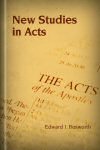
Edward I. Bosworth’s New Studies in Acts provides 19 devotional studies covering the entirety of Acts. They were designed for use by early twentieth-century YMCA/YWCA study groups. Each study is divided into seven daily devotional pieces, providing 19 weeks of material.
Edward I. Bosworth (1861–1927) was a Congregationalist pastor and academic. In 40 years at Oberlin Theological Seminary, he was professor of Bible, dean of the Graduate School of Theology, and acting president. Many of his works were used for YMCA/YWCA classes, including his Studies in the Teaching of Jesus and His Apostles, Studies in the Acts and Epistles, Studies in the Life of Jesus Christ, and Christ in Everyday Life.
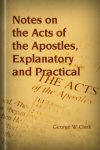
This volume contains George W. Clark’s commentary on Acts. Clark approaches the text as the divinely inspired word of God and offers extensive explanatory and practical commentary.
George W. Clark was the author of The Harp of Freedom, A New Harmony of the Four Gospels, The Mighty Worker: Lessons in Mark and other titles.
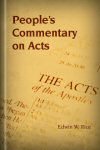
Edwin W. Rice’s People’s Commentary on Acts provides extensive critical, exegetical, and applicative notes. He also includes contextualizing information on ancient Near Eastern culture and history.
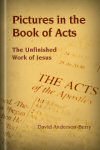
In this volume, David Anderson-Berry provides 10 “pictures” of narratives and characters of the book of Acts. Originally published serially in The Witness, Anderson-Berry’s volume colorfully fills in the different people, places, and happenings of acts with the context that surrounded them. Ultimately rooted in the biblical text, these sketches are a helpful tool for bringing the facts of Acts to life.
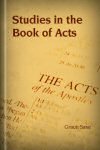
Grace Saxe’s Studies in the Book of Acts provides a study for each of Acts’ 28 chapters designed for neighborhood Bible classes.
Grace Saxe published studies designed for small group use for several books of the Bible in the early twentieth century.
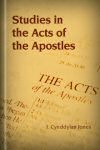
J. Cynddylan Jones’ Studies in the Acts of the Apostles includes 15 of his sermons on key passages from Acts, written with young preachers in mind.
J. Cynddylan Jones (1840–1930) was a Welsh Congregational minister and theologian. He published several well-received commentaries on New Testament texts in both English and Welsh.
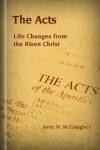
Janie W. McGaughey’s The Acts: Life Changes from the Risen Christ arranges 12 studies based around the “pivotal events” in the establishment of the church, designed for a year-long small group study.